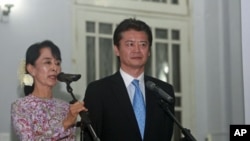Burma’s pro-democracy leader Aung San Suu Kyi met late Monday at her lakeside home with billionaire American philanthropist George Soros, the latest public figure to pay the Nobel Prize laureate a visit since her release a year ago from 15 years of on-and-off house arrest.
Soros, whose foundation supports grantees that provide uncensored news on Burma and activists who call public attention to abuse of power, arrives in the wake of a stream of visits, predominantly by senior foreign dignitaries.
Political Science Professor Carl Thayer of the Australian Defense Force Academy says influential business and political leaders are lining up to ride the crest of change in Burma and to reinforce reform efforts.
"As intelligent as she is, she has been relatively isolated," he says. "And she needs, I think, the advice of people like Soros and others, the financing and foundations, and people on the ground to provide and reinforce her efforts."
In the past month, Aung San Suu Kyi met with the U.S. Secretary of State Hillary Clinton, Thailand’s Prime Minister Yingluck Shinawatra, and foreign ministers from Indonesia and Japan. Later this week, British Foreign Secretary William Hague is expected to visit.
Hague’s visit will coincide with a general amnesty for prisoners announced Monday by Burma’s state media.
In what is typically a regular gesture to mark Burma’s Independence Day, selected prisoners will have their sentences reduced beginning Tuesday. It is not clear how many in jail will be affected by the amnesty or how many political prisoners will be included.
Burma is holding hundreds of people for their political beliefs. Clinton and other officials visiting Burma have joined Aung San Suu Kyi in calling for their immediate release.
Thitinan Pongsudhirak, Director of the Institute of Security and International Studies at Bangkok’s Chulalongkorn University, says Clinton’s visit opened the way for diplomatic engagement with Burma, also known as Myanmar.
“It is a green light for other countries to begin to lift sanctions [and] provide development assistance," he says. "They have to be careful by not promoting the commercial interests too much too soon. There are some dissident groups that see all of this as a big kind of commercial deal.”
Burma is a major source of natural gas, gems, and timber, but trade is limited by Western countries because of economic sanctions over the military’s suppression of democracy and human rights.
Since the government of President Thein Sein took office in March, replacing overt military rule, it won praise for a series of liberal political and economic moves. President Thein Sein held direct talks with Aung San Suu Kyi after assuming office.
Thitinan says cooperation between the two is vital for the momentum of reform to be sustained. He says there are still hardliners in the government who would derail the process if it goes too fast.
"The momentum that we are seeing is just unprecedented and breathtaking," he says. "It is going to be difficult to reverse some of it without incurring a great cost to the Myanmar rulers. Even if they want to slow it down, to reverse it, now they are in too deep. Now I think leading up to the Myanmar chairmanship of ASEAN 2014. I expect the reforms to be sustained."
On Sunday, Burmese authorities hiked gas prices by 30 percent. A similar unannounced price jump in 2007 sparked protests that were later crushed by the military.
In Burma, Visiting Dignitaries Line Up to Ride Crest of Change












